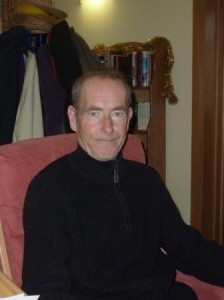 There are many different aspects to the care we provide at Severn Hospice. We care for those nearing the end of their life and those who need help to get the symptoms they are experiencing as a result of their illnesses or treatments they are receiving under control.
There are many different aspects to the care we provide at Severn Hospice. We care for those nearing the end of their life and those who need help to get the symptoms they are experiencing as a result of their illnesses or treatments they are receiving under control.
Pete Ferriday, from Apley, came to stay with us at one of our inpatient wards in Shrewsbury after he lost his appetite following a course of chemotherapy.
For some people being diagnosed with a progressive illness can come as a bit of a shock as you never think it’s going to happen to you, Pete was one of those people.
“I’ve always been a very healthy person and never really been ill,” says Pete. “I broke my ankle in 1982 but apart from that in the last 30 years I’ve never been near a hospital apart from to visit people. My family joked that I had inherited my father’s genes; he lived until he was 90-years-old even though he smoked and drank, and I started to believe I would be the same.”
After developing problems in 2012 Pete visited his GP who gave him some devastating news.
“The diagnosis of cancer of the oesophagus came as a bit of a wallop having never really been ill before. I found it difficult to get to the point of diagnosis which has been hard to deal with. Having got the diagnosis I’ve been doing my best to deal with it on a daily basis. It’s being aware of your condition and having to make adjustments. It’s been tough. I think initially I overlooked just how difficult it was for my family but they have all rallied round and the support they have given me has been fantastic. I try to stay positive, I’ve had my dark moments obviously, but I do kick myself and say ‘come on, this is no good for you’.”
Being referred to the hospice can be daunting and it is common for our patients to feel a little apprehensive about coming here. Pete admits he was scared about coming to the hospice initially.
“Like a lot of people I thought the hospice was where you go to die of cancer or other serious illness. I was sent some literature when I was first diagnosed and I thought this is all about death and dying and I didn’t want to read about it because I was frightened like a lot of people.”
Pete’s health quickly deteriorated following the loss of his appetite and he was referred to the hospice by one of Clinical Nurse Specialists.
“I was in a pretty poor condition as I hadn’t eaten for ten days; I’d lost a lot of weight and was very weak. My Clinical Nurse Specialist, Sarah Hill, asked if I would be willing to give the hospice a try as I needed a little extra help to get back on my feet. I had reservations but said I would give it a try. Within two hours she had called back and said if I could get to the hospice in Shrewsbury by 2pm there was a bed for me.”
Despite his initial concerns, Pete says he is glad he was referred to our inpatient ward because he has really benefited from his stay.
“I think in some ways it was extremely fortuitous that I had that spiral downwards because I have found out what a fantastic organisation the hospice is. Spending a few days here has transformed my views about the hospice. In the short time I’ve been here there has been such a transformation in my condition. Within 24 hours of being here my family could see the difference. I knew I had to eat and with the help of the medicines I got my appetite back a little bit.
“It’s been a really positive experience for me. It’s all been fantastic from the high standard of care given to me by the wonderful staff and volunteers to the delicious food. I’ve now got to the point where I am well enough to be discharged. I’ve enjoyed my time here but I am looking forward to going home and sleeping in my own bed. If I had to spend another week at the hospice I wouldn’t worry about it. Nothing can match the high quality of care and the dedication of all the staff at the hospice.”













